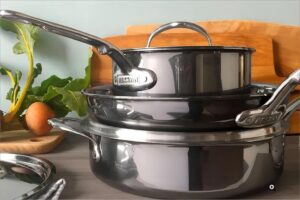 Cookware made of various materials is offered to cater to people’s varying tastes. There are considerable differences in cookware materials. Cast iron cookware is well-known for its longevity. Nonstick ceramic cookware, on the other hand, is ideal for cooking eggs and other meals without sticking. Stainless steel cookware is well-known for its all-around functionality and gleaming appearance. But have you considered titanium or ceramic cookware? We will evaluate titanium coating vs ceramic coating cookware in this post to help you make an informed selection based on your tastes and cooking needs. Understanding the distinctions between these coatings can help you choose the best pan for your culinary adventures, whether you’re an aspiring chef or a home cook.
Cookware made of various materials is offered to cater to people’s varying tastes. There are considerable differences in cookware materials. Cast iron cookware is well-known for its longevity. Nonstick ceramic cookware, on the other hand, is ideal for cooking eggs and other meals without sticking. Stainless steel cookware is well-known for its all-around functionality and gleaming appearance. But have you considered titanium or ceramic cookware? We will evaluate titanium coating vs ceramic coating cookware in this post to help you make an informed selection based on your tastes and cooking needs. Understanding the distinctions between these coatings can help you choose the best pan for your culinary adventures, whether you’re an aspiring chef or a home cook.
Titanium cookware
A titanium coating pan is a form of cookware that has been coated with a nonstick layer made of titanium. This coating is put to the pan’s surface to give nonstick characteristics, making cooking and cleaning easier. Titanium coating is recognized for its tensile strength and scratch resistance, making it ideal for high-temperature cooking and long-term use.
It’s important to note, however, that the word “titanium coating” can occasionally refer to a coating that contains titanium particles rather than being entirely composed of titanium, therefore the particular qualities can vary depending on the composition of the coating.
Pros of titanium cookware
- Titanium cookware is more durable than aluminum cookware.
- It weighs 45% less than stainless steel.
- Titanium cookware is long-lasting.
- It is rust-resistant cookware.
- Titanium cookware is so long-lasting that you may use it for years.
- Titanium-reinforced cookware is nonstick and evenly distributes heat.
- Titanium cookware is non-toxic even when heated to high temperatures.
Cons of titanium cookware
- Pure titanium cookware is not non-stick.
Cooking tips
Preheat thoroughly: Preheat the cookware before putting in the ingredients, so that the ingredients can be heated evenly and the frying and baking will have a better taste.
Less smoke: The surface of titanium cookware is smooth, less smoke, and healthier.
Avoid empty burning: Empty burning will damage the surface of the cookware and shorten its service life.
Use a wooden spatula or a silicone spatula: Avoid using a metal spatula to avoid scratching the surface of the cookware.
Ceramic cookware
A ceramic coating pan is a form of nonstick cookware that has been coated with a layer of ceramic-based substance. This coating is often put to the pan’s surface to prevent food from adhering and to make cleaning easier. Ceramic coatings are well-known for their nonstick properties and are usually thought to be safe for cooking because they do not include PTFE or PFOA.
Ceramic coatings, on the other hand, may not be as durable as other types of coatings, necessitating more cautious treatment to avoid scratching or chipping.
Pros of ceramic cookware
- Ceramic cookware offers a healthier cooking experience.
- It has an attractive appearance.
- It has no propensity to leach at low temperatures.
- Ceramic cookware is enhanced with a nonstick cooking experience.
- Proper ceramic pan care can extend its life.
Cons of ceramic cookware
- Ceramic cookware has a heat conductivity range of 450°F to 500°F. When heated further, it begins to emit hazardous vapors.
Cooking tips:
Low temperature slow cooking: Ceramic cookware is suitable for low temperature slow cooking, which can make food softer and more flavorful.
Avoid sudden cooling and heating: Ceramic cookware has poor thermal shock resistance, so avoid sudden cooling and heating to prevent cracking.
Use medium or low heat: Ceramic cookware heats up slowly, so use medium or low heat to avoid burning the bottom.
Avoid empty burning: Empty burning will damage the surface of the cookware and shorten its service life.
Comparison between titanium and Ceramic Cookware
Heat conductivity
- Titanium Coating: Titanium-coated pans have high heat conductivity, resulting in equal cooking across the pan. Titanium transmits heat effectively from the heat source to the meal, giving in consistent cooking outcomes.
- Ceramic Coating: Ceramic-coated pans provide good heat transmission, allowing for more uniform cooking. Ceramic, on the other hand, may not transfer heat as well as titanium, resulting in significantly slower heat dispersion.
Durability
- Titanium Coating: Titanium-coated pans are well-known for their long-lasting durability. Because titanium is very resistant to scratches, wear, and tear, the coating is long-lasting and suited for daily usage.
- Ceramic Coating: Ceramic-coated pans are normally more durable, although they are more susceptible to chipping or scratches if not handled carefully. To avoid damage, the ceramic coating must be handled gently and using non-metal tools.
Safety and health concerns
- Titanium Coating: Titanium coating is usually regarded as safe for use in the kitchen. It is crucial to note, however, that the composition of the coating may differ based on the individual product. Some titanium-coated pans may include extra materials, so verify the manufacturer’s specs for assurances of safety.
- Ceramic Coating:Ceramic coating is recognized for being non-toxic and environmentally friendly. It is free of hazardous chemicals such as PFOA and PTFE, making it a safer alternative for cooking. Ceramic-coated pans are a popular option for health-conscious people.
Maintenance and care
Titanium Coating: Titanium-coated pans are quite simple to keep clean and maintain. They can endure greater temperatures and are more scratch-resistant. To maintain the coating’s integrity, they normally require moderate handwashing with warm soapy water.
- Cleaning: How to care for ceramic cookware?Use warm water and a soft cloth or sponge to clean, and avoid using hard objects such as steel wool to avoid scratching the surface.
Wipe dry in time after cleaning and keep dry. If there are stubborn stains, you can use a neutral detergent to clean, but do not soak for a long time. - Avoid empty cooking: Empty cooking will damage the surface of the cookware and shorten its service life. Be sure to preheat the pot before use, and stir-fry immediately after adding the ingredients.
- Avoid violent collision: Although titanium is hard, violent collisions can easily cause deformation or scratches.
Ceramic Coating: To extend the life of ceramic-coated pans, special care and maintenance are required. They should be cleaned gently and using non-abrasive cleaning equipment. Scrubbing too hard or using metal tools might cause the ceramic covering to crack or wear away.
- Cleaning: The cleaning method is similar to that of titanium cookware, use warm water and a soft cloth or sponge to clean.
If there are tea or coffee stains, you can use lemon juice or white vinegar to soak and then clean. - Avoid sudden cooling and heating: Ceramic cookware has poor thermal shock resistance, so avoid putting a hot pot directly into cold water, or heating a cold pot directly on the fire.
- Avoid high-temperature empty burning: High-temperature empty burning will damage the glaze, affecting the appearance and service life.
Avoid scratching with hard objects: Use a soft cloth or sponge to clean, and avoid using hard objects such as steel wool.
Which is better titanium or ceramic cookware?
Your priorities will determine whether you choose titanium or ceramic cookware. Titanium cookware is a superior choice for durability and adaptability because of its ability to tolerate high temperatures and prevent scratches. If nonstick characteristics and ease of washing are more essential to you, ceramic cookware may be a better choice due to its nonstick capabilities and diversity of designs.
The Price Titanium Cookware VS Ceramic Cookware
The price of titanium and ceramic cookware is affected by many factors, such as brand, material, craftsmanship, size, capacity, function, etc. Generally speaking, the price of titanium cookware is relatively high because it is a rare metal and the manufacturing cost is relatively high.
The price range of ceramic cookware is relatively wide, from low-end to high-end. Some special materials will be more expensive, such as bone china, stoneware, etc. When purchasing, you can consider your budget, product usage and price.
| Factors | Titanium Cookware | Ceramic Cookware |
| Material | Rare metal, high cost | Common materials, relatively low cost |
| Craft | Complex manufacturing process | Relatively simple manufacturing process |
| Brand | Predominantly high-end brands | Diverse brands, significant price differences |
| Function | Diverse functions, wide price range | Relatively simple functions, narrower price range |
Is all titanium cookware non-stick-like ceramic?
Ceramic pots and pans are all nonstick. They provide a better cooking experience with no difficulties. However, not all titanium cookware is nonstick. Notably, pure titanium cookware does not have a nonstick cooking surface. Titanium-reinforced cookware (pots and pans constructed of titanium and cast aluminum) is nonstick. So, if you want to avoid food sticking, invest in ceramic cookware or titanium-reinforced cookware.
Cost-effective titanium and ceramic cookware recommendations
Titanium Camping Cookware Set
The set comes with a frying pan, medium pot and large saucepan, each with a durable, retractable folding handle for convenience and safety.
Compact and space-saving, the titanium pots and pans compress and nest together to fit easily into a backpack and store in a convenient mesh drawstring bag.
Lightweight, the cookware set weighs 294g/10.37oz in total and holds 1850ml/65fl oz of liquid.
Ceramic Frying Pan Set
Non-stick coating: With cutting-edge ceramic coating, it has unparalleled scratch resistance, and the mineral stick coating provides long-lasting durability while being easy to clean.
Swirl Design: The concentric ring design on the bottom of the frying pan and frying pan can heat food quickly, saving cooking time and reducing oil intake.
Bakelite handle: It is comfortable to hold and safe to use, which can minimize scalding incidents.
Induction cooker bottom compatible: It is suitable for all stoves such as induction, gas, ceramic, electric, halogen and solid fuel stoves. Not suitable for oven
Ultralight Titanium cookware is two in one, no buckle design, folding handle easy to take, safe and hot.
Ultralight Titanium cookware made of titanium, feature by super lightweight do not produce toxic substances after heating and Compact design with folding handle.
Directly fry Ultralight Titanium bowl over the flame and it can use as the fry pan or small pot。Titanium Cookset no gap, not easy to stay dirt, easy to clean.
FAQ
Is titanium cookware safe for cooking?
What is the difference between titanium and ceramic cookware?
| Feature | Titanium Cookware | Ceramic Cookware |
| Material | Metal | Non-porous ceramic |
| Heat Distribution | Excellent | Good |
| Durability | High | High |
| Weight | Lightweight | Can be heavier |
| Non-stick Properties | Excellent | Excellent |
| Price | Generally higher | Can be more affordable |
| Fragility | Less fragile | More fragile |
Which is better, titanium or ceramic cookware?
Both titanium and ceramic cookware offer excellent performance and health benefits. When choosing, you need to choose the one that suits you based on your budget and needs. If you prioritize lightweight, durable cookware, titanium may be a good choice. If you like easy-to-clean, colorful cookware, ceramic may be a better choice.
Can I use metal utensils on titanium or ceramic cookware?
Yes, you can usually use metal utensils on titanium or ceramic cookware. Both materials have excellent durability and scratch resistance. However, it is recommended to read the instructions and care instructions carefully when using them, which will extend their life.
Are titanium and ceramic cookware dishwasher safe?
Final Thoughts
So, when it comes to deciding between titanium coating and ceramic coating pans, each has its own set of pros and disadvantages. Titanium coating is a favorite choice for many cooks due to its high heat conductivity, durability, and superb nonstick characteristics. The ceramic coating, on the other hand, is a non-toxic and environmentally safe choice with high heat retention and adaptability. When selecting a selection, consider your culinary tastes, budget, and unique demands. Titanium-coated pans may be the best option for you if you value heat conductivity, durability, and long-lasting nonstick characteristics. Ceramic-coated pans, on the other hand, may be more suitable if you value non-toxicity, eco-friendliness, and ease of maintenance.
Other related articles recommended
Is Titanium Cookware Safe?
Can You Use A Camping Stove Indoors?
The Best Camping Chairs For Seniors and Older Adults
Is Titanium Cookware Really Safe? A Deep Dive into Health Concerns and Advantages
Can Metal Be Used on Stainless Steel Utensils?
At DeerMaple, we specialize in ODM service, offering high-quality and innovative gear tailored to your needs.
If you are interested in outdoor gear wholesale, please contact us.

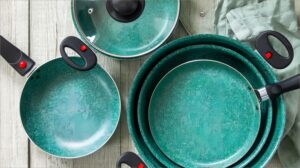
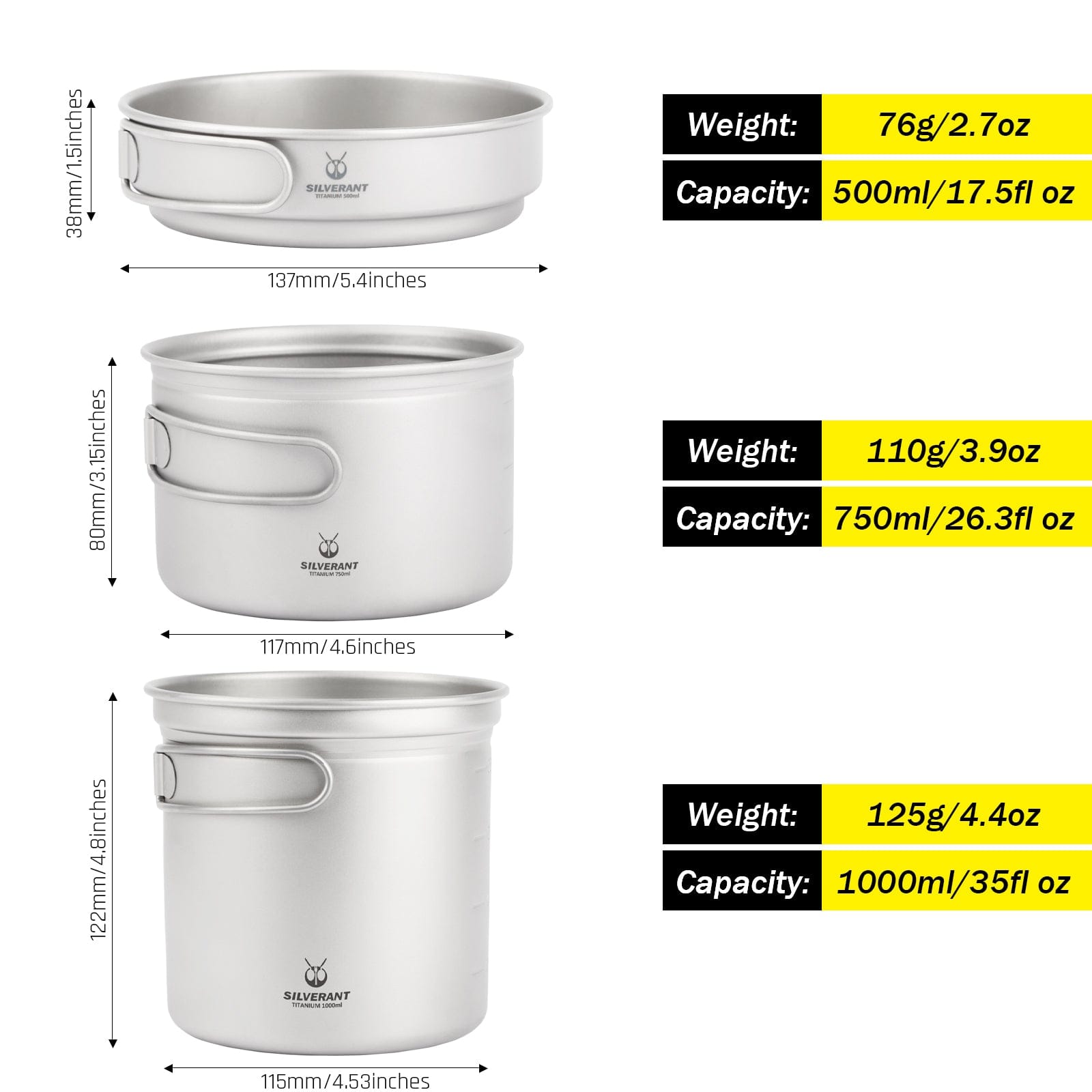

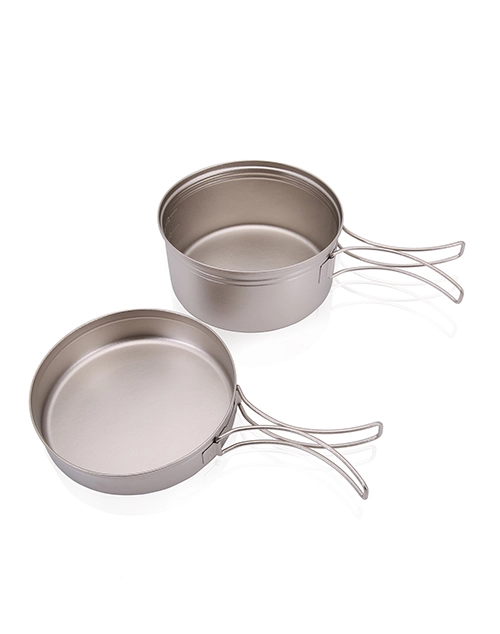



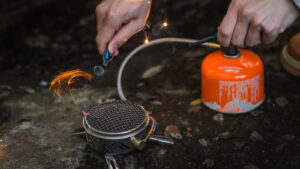
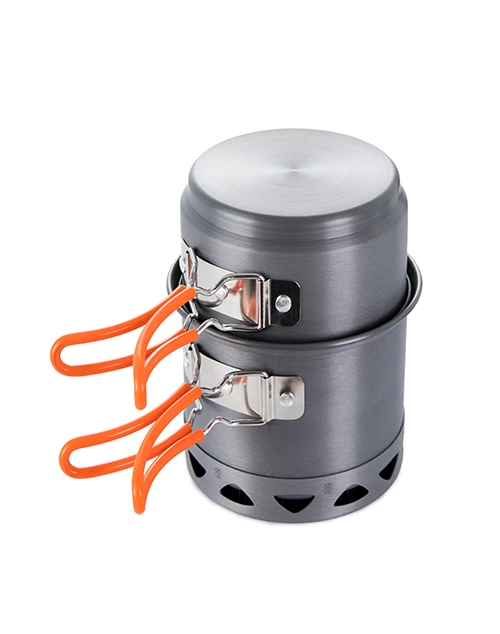

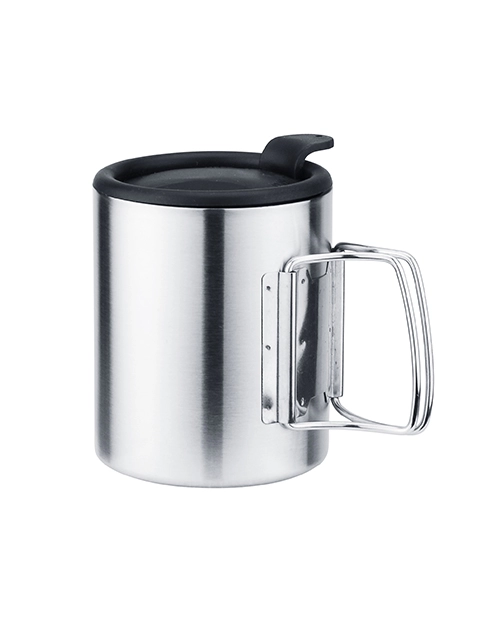


One thought on “Titanium vs Ceramic Cookware: What’s the Difference”
I simply could not go away your web site prior to suggesting that I really enjoyed the standard info a person supply on your guests Is going to be back incessantly to investigate crosscheck new posts